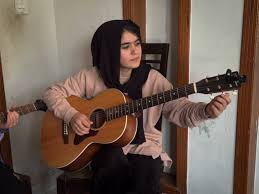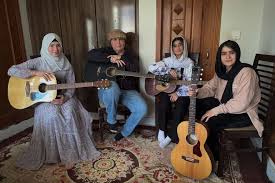Islamabad, Pakistan – In a modest two-story home in Pakistan’s capital, the soft melodies of guitars fill a small bedroom where four young Afghan refugees- Yasemin (18), Zakia (16), Shukriya (14), and Uzra (7) spend hours practicing their music. These girls, who once pursued their passion at Miraculous Love Kids, a Kabul-based music school founded by American musician Lanny Cordola, fled Afghanistan with their families after the Taliban’s return in August 2021.
Yasemin and Uzra, who are sisters, live in this home, while Zakia and Shukriya reside nearby. Their daily routine revolves around practicing music six days a week under Cordola’s guidance. On a recent visit, the girls were busy tuning their guitars, teasing one another between off-key chords.
Yasemin, clad in a gray sweatshirt and black scarf, leads the group. Inspired by Blues legend B.B. King and Pink Floyd’s David Gilmour, she dreams of one day collaborating with Gilmour. As she tunes her guitar with a red pick, she offers instructions to her bandmates.
The girls’ lives were upended when the Taliban seized control of Afghanistan, enforcing harsh restrictions on women. Fearing for their safety, they remained indoors. Determined to help them escape, Cordola left Kabul for Islamabad on the day of the takeover and spent months securing funding and negotiating with agents to arrange their relocation. By April 2022, he had successfully evacuated seven students to Pakistan, with hopes of resettling them in the United States.
Three of the girls have since moved to the U.S., and Yasemin, Zakia, Shukriya, and Uzra were set to follow on February 5. “It felt like we had everything in place. They [the U.S. government] did all their medical tests, vetting, screening, and interviews. We had the date,” said Cordola.
However, their plans came to an abrupt halt following Donald Trump’s return to office. His administration immediately suspended refugee programs for 90 days, stalling their relocation indefinitely.
Meanwhile, the Pakistani government has intensified its crackdown on Afghan refugees, announcing plans to deport all Afghan nationals including those with valid documentation by June 30. For refugees awaiting resettlement in Western countries, the deadline is even tighter, with deportations set to begin on April 1.
‘Girl with a Guitar’
Each day, Cordola picks up Zakia and Shukriya in a van for practice sessions at Yasemin’s home, where they rehearse for three to four hours. Zakia, dressed in a lilac floral dress and white headscarf, strums her guitar marked with the letter “Z,” tapping her feet in rhythm. She is a devoted fan of Coldplay’s Chris Martin.
Shukriya, with her signature double braid and rosy cheeks, admires American musician Dave Matthews but also loves South Korean band BTS, especially RM. “RM is my favorite. I like his dancing and rapping… it’s beautiful,” she says, while Cordola shakes his head with amused disapproval.

Uzra, the youngest, wears a sequined teddy bear sweatshirt and a lime-colored sports watch. Despite her small size, she is intensely focused when practicing. “She is a normal seven-year-old in a lot of ways. But when she is in the studio, she is very, very focused. I can’t joke with her when she is in there,” Cordola remarks.
As the session continues, the girls play their original instrumental piece, “Girl with a Guitar.” After practice, they resume their daily routines—sharing meals, praying, helping their mothers, and spending time with family. Uzra, full of energy, often finds ways to sneak outside and play with the neighbors’ child.
Uncertain Future
Pakistan has ramped up its deportations of Afghan refugees, expelling over 842,000 individuals between September 2023 and February 2025, according to the UNHCR. The country’s Ministry of Foreign Affairs states that while nearly 80,000 Afghans have been resettled in various nations, around 40,000 remain in Pakistan awaiting relocation. Among them, 10,000 to 15,000 were cleared for U.S. resettlement before Trump’s policy shift blocked further transfers.
Philippa Candler, Pakistan’s UNHCR representative, expressed concern, warning that “forced return to Afghanistan could place some people at increased risk.” She urged Pakistan to continue offering protection, regardless of refugees’ documentation status.
Fauzia, Yasemin and Uzra’s mother, remains grateful to Pakistan for hosting them but is anxious about the future. “Our lives were at risk in Afghanistan, and even in Pakistan, there is no peace. Whether it is the U.S. or any other government, we request help for those whose lives are in danger,” she pleads.
For now, the girls find solace in their music. “Whenever I’m sad, I hold my guitar and forget all of the sadness,” says Yasemin. “It has changed my life.”
